






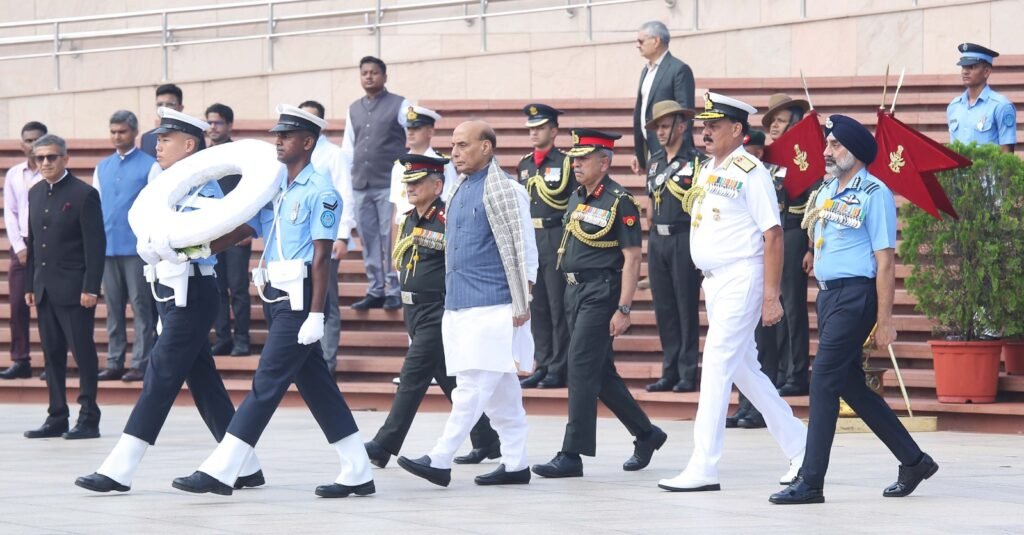
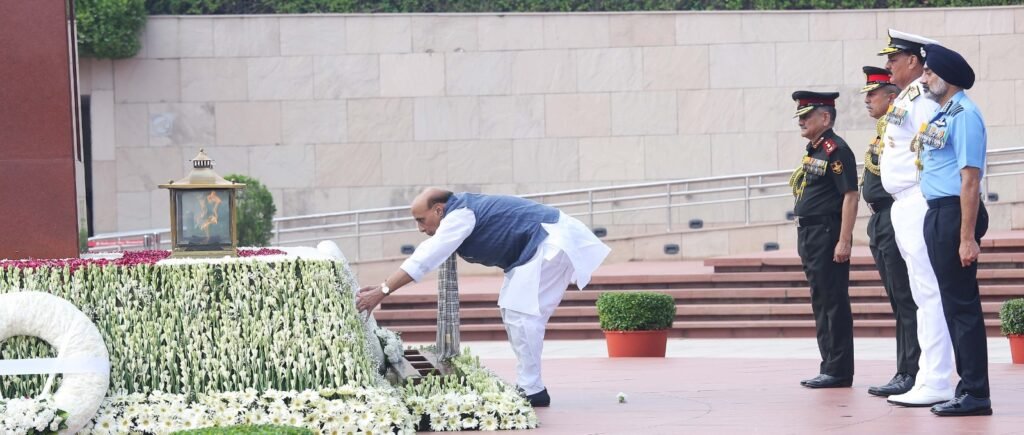
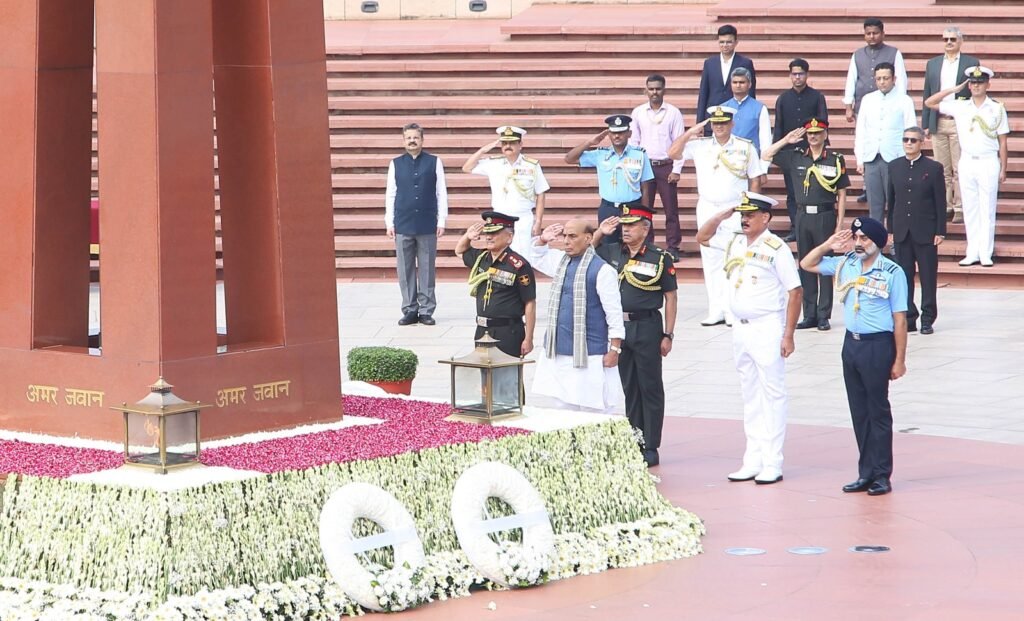
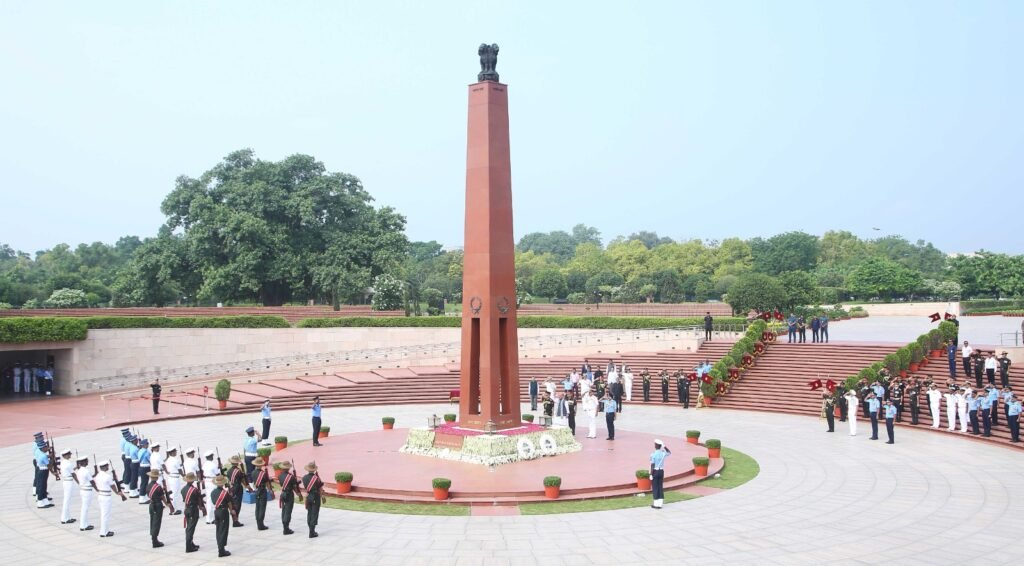
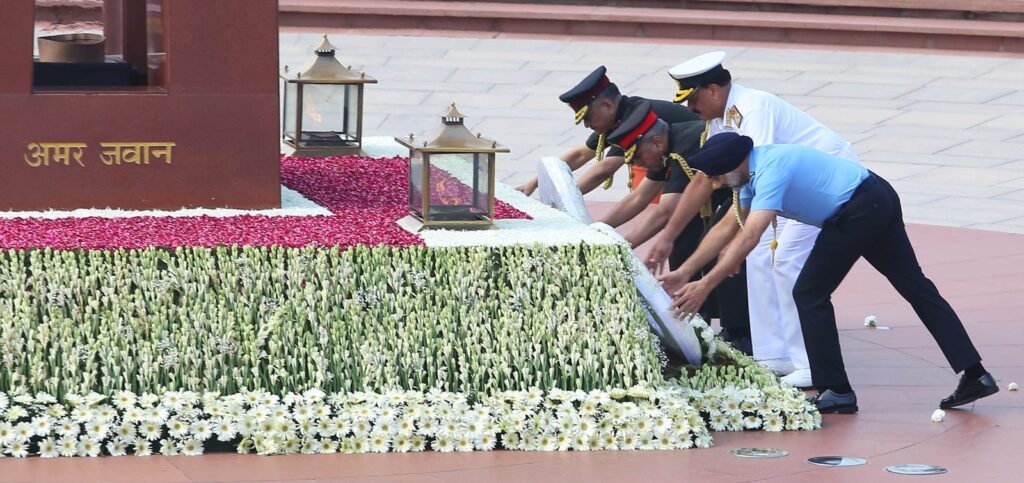

ना झुके, ना डरे, ना रुके!
कारगिल के शूरवीरों ने शौर्य, बलिदान और राष्ट्रभक्ति की ऐसी अमिट कहानी लिखी, जो हर भारतीय के हृदय में सम्मान और गर्व बनकर धड़कती है।आइए नमन करते है उन वीरों को, जिन्होंने अपने लहू से विजय का इतिहास रचा।

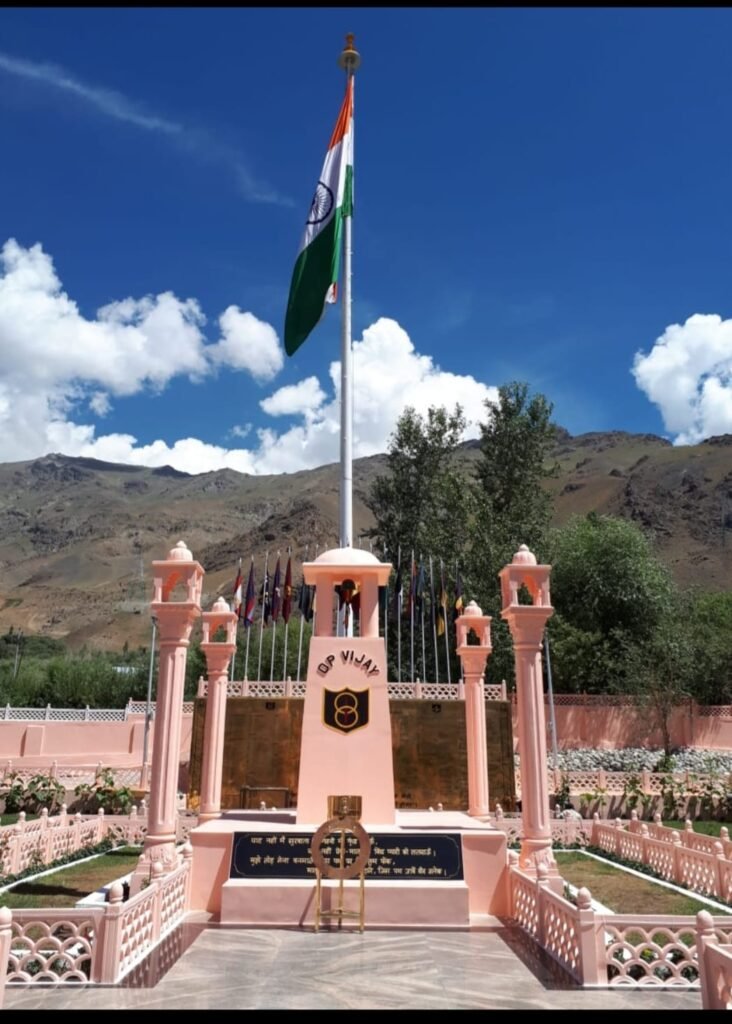

As the nation commemorates the 26th anniversary of the 1999 Kargil conflict, a former wartime commander of the Kargil Brigade, Brig Surinder Singh, has moved the Supreme Court, seeking a fresh probe and “corrections” in war records.
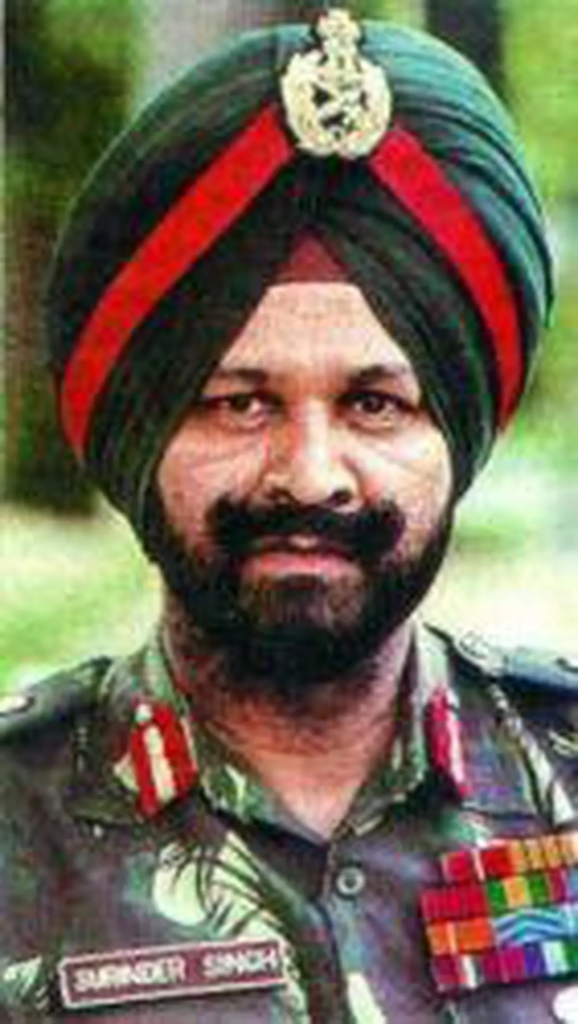
He was removed from command midway during the conflict and later his services were terminated for allegedly mishandling classified documents. Claiming in a public interest litigation (PIL) filed on May 24 that the truth still lies buried under layers of bureaucratic silence and doctored reports, he has sought a de novo inquiry headed by a Supreme Court judge or existing group of ministers.
Detailing events that led to the conflict and subsequent actions, he accused the top military hierarchy of suppressing facts, creating false narratives, reshuffling key appointments and withholding human and material resources to deal with the situation despite knowing the grim reality. He said the decisions of top generals were contrary to all military teachings and established practices.
The Kargil Review Committee (KRC) set up by the government, he said, had limited scope and adopted a faulty methodology of not examining direct evidence from the eyewitnesses and the ground troops and commanders at various levels on the frontline.
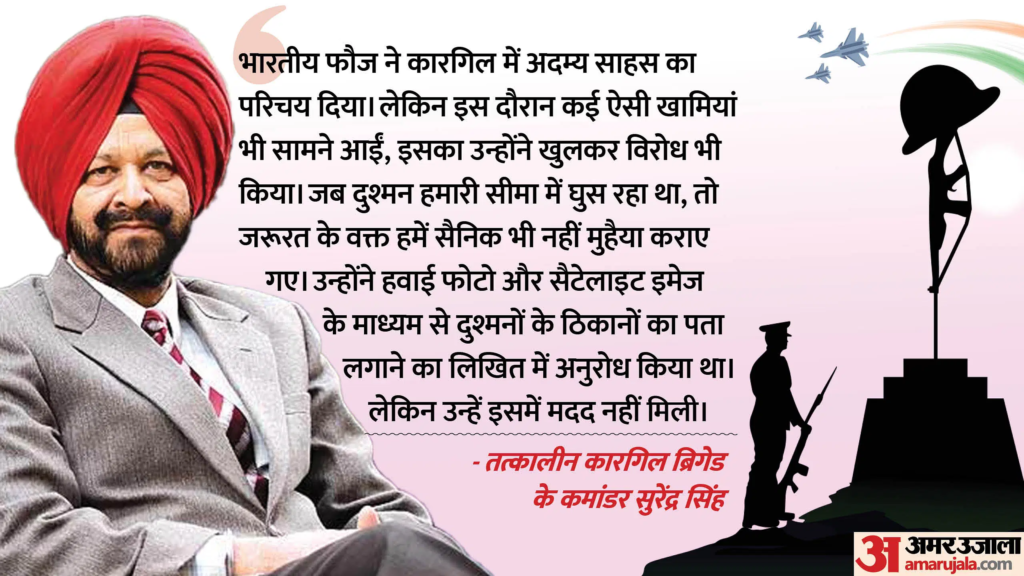
Most facts were not investigated by the KRC as it was not appraised about them. Despite this grave deficiency, KRC went ahead to recommend measures to safeguard national security and avert future occurrence of similar kinds.
He also referred to a statement made in August 2006 by Air Chief Marshal AY Tipnis, who was the Air Chief during the conflict, that Army generals deliberately attempted to hide the Kargil intrusions from the government as late as mid-May 1999 because they had been caught off guard. “The first lesson we ought to have learnt from this, and which I believe the Kargil Committee did not bring out, is to say that whatever be the situation, don’t keep it to yourself,” the former Air Chief had said.
“Thus, a highly avoidable war was thrust upon the nation to recover own area intruded by the enemy over a front of more than 227 km along the LoC,” he said. “The Kargil War would not have happened, had the defences asked for in the crucial locations as correctly assessed and persistently demanded by the petitioner were provided and troops allotted,” he added.
The flare-up between Thailand and Cambodia has killed at least 32 people

India on Saturday advised its citizens in Cambodia to avoid travelling to border areas as the clash between Thailand and Cambodia over a disputed border entered its third day.
According to reports, the flare-up, which began on Thursday, has killed at least 32 people — 19 in Thailand and 13 in Cambodia.
“In view of the ongoing clashes at the Cambodia-Thailand border, Indian nationals are advised to avoid travelling to the border areas,” the Indian embassy here said in an X post.
It also urged Indian citizens to contact the mission in case of any emergency at +855 92881676 or email cons.phnompenh@mea.gov.in.
On Friday, India issued a similar advisory to its citizens in Thailand, asking them to exercise caution and avoid travelling to seven provinces of the country.
Kargil Vijay Diwas: Says combat power enhanced, air defence upgraded since Pahalgam

rmy Chief General Upendra Dwivedi on Saturday said Operation Sindoor was a clear message “that those who support terrorism will not be spared
“On the night of May 6 and 7, the Army targeted nine high-value terrorist locations in Pakistan and Pakistan-occupied Kashmir without harming any innocent citizens. This was not just an answer but a clear message that those who support terrorism will not be spared,” General Dwivedi said during his address on Kargil Vijay Diwas. An event was organised to mark the occasion at the Kargil War Memorial in Ladakh.
He said after the Army’s unprecedented victory in 1999, it became clear that the military won’t allow the country’s unity and integrity to be harmed.
General Dwivedi said, “The same tradition continued during Operation Sindoor, when the Army, with the same courage and determination, targeted terrorist infrastructure in Pakistan and achieved a decisive victory by effectively repelling the offensive operations by Pakistan.”
Stating that while India gave peace a chance, Pakistan acted with cowardice, the Army Chief said, “Operation Sindoor was our resolve, our message and our answer.” He emphasised that after the Pahalgam terror attack in April, it was decided that the response “would be decisive”.
“Our air defence stood like an unbreakable wall. No drone or missile could breach it. This was possible due to the whole-of-nation approach, where the Army, Air Force, Navy, the government and private departments and even NGOs stood together,” he said.
The Army Chief warned that any forces planning to harm India’s sovereignty, integrity or people would face a “decisive answer. This is the new normal of India,” he said, adding that while “India seeks peace, it will respond decisively to provocation”.
General Dwivedi stressed that today’s Army was not only successfully countering current challenges but also evolving into a modern, transformative and future-oriented force.
Announcing the sanctioning of an all-arms brigade, “Rudra”, he said, “This brigade will integrate combat components such as infantry, mechanised infantry, armoured units, artillery, special forces and unmanned aerial systems, along with logistic and combat support.”
Additionally, he revealed that agile and lethal special forces, the Bhairav Light Commando Battalion, had been raised and were always ready to surprise the enemy at the borders.
General Dwivedi also highlighted the creation of drone platoons in every infantry battalion and the formation of a ‘Shaktibaan’ regiment in the artillery, equipped with drone and counter-drone systems as well as loitering ammunition.
“A diverse composite battery has also been established in every regiment, equipped with these advanced systems,” he said. The Army Chief noted that combat capabilities would multiply in the coming days, with the Army’s air defence being upgraded with indigenous missile systems. He also spoke about the Army’s role in nation-building in border areas through various initiatives.

Wreath-laying ceremony held for Agniveer killed in landmine blast
White Knight Corps Chief of Staff Major General Shailendra Singh led the solemn ceremony held at Satwari military station to honour 20-year-old Lalit Kumar of 7 Jat regiment, he said.
Superintendent of Police (city south) Ajay Sharma and some civil officers also attended the ceremony and paid their tributes.
Kumar’s mortal remains were later sent to his home town Meerut in Uttar Pradesh to perform the last rites, the official said.
The Agniveer lost his life, while two other soldiers were injured in a land mine blast when they were on an area domination patrol in the general area of Krishna Ghati Brigade on Friday.
UT Admn told to pay Rs 50 lakh relief, amount to be recovered from accused

The Supreme Court on Monday ordered a CBI probe into alleged illegal detention and custodial torture leading to “complete castration” of a constable by the Jammu and Kashmir Police at the Joint Interrogation Centre in Kupwara in February 2023.
A Bench of Justice Vikram Nath and Justice Sandeep Mehta, which directed the CBI to register a case within seven days, also directed the CBI Director to constitute a special investigation team (SIT) headed by an officer not below the rank of Superintendent of Police to investigate the matter.
“The police officials found responsible for the custodial torture shall be arrested forthwith and not later than a period of one month from today. The investigation shall be completed within 90 days of the registration of the FIR,” it ordered.
“The entire material collected during the inquiry conducted so far, including related documents, medical records, CCTV footage, forensic evidence and case diary, shall be immediately handed over to the competent officer of the CBI,” the Bench ordered.
Allowing constable Khursheed Ahmad Chohan’s appeal against the September 18, 2023, judgment, the top court also ordered the UT Administration to pay Rs 50 lakh as compensation to him “in order to provide some solace to the victim and his family for the barbaric acts of custodial torture leading to complete castration…” It listed the matter again on November 17, 2025, for receiving a status report.
Writing the judgment for the Bench, Justice Mehta directed that “the said amount shall be recoverable from the officer(s) concerned against whom a departmental proceeding shall be initiated upon conclusion of the investigation by the CBI. The CBI shall submit its status report to this court by November 10.”
“Considering the gravity and magnitude of the custodial torture established through medical records and the institutional apathy that followed, we are of the considered opinion that this is a fit case for awarding compensation to the victim of the violence, i.e., the appellant herein. The violation of Article 21 is not only evident but egregious. The appellant, a police constable himself, suffered life-debilitating injuries while in the custody of fellow state actors, and despite repeated complaints, no effective redress was provided,” it noted.
“The CBI shall also conduct a comprehensive inquiry into the systemic issues at the Joint Interrogation Centre, Kupwara, including examination of all CCTV systems, interrogation from all personnel present during the relevant period, forensic examination of the premises and review of all protocols and procedures followed for detention and interrogation of suspects,” the Bench ordered.
Chohan alleged that he was illegally detained and tortured after being summoned for a narcotics inquiry in February 2023. His wife’s attempts to register an FIR for custodial torture didn’t fructify while the police registered a case against him for an alleged suicide attempt. The high court refused to quash the FIR, forcing him to move the top court.

The General Officer Commanding-in-Chief (GOC-in-C) of the Northern Command, Lieutenant General Pratik Sharma, on Wednesday reviewed the security environment and ongoing counter-terrorist operations in the Doda, Ramban and Kishtwar districts of the Jammu region.
A gunfight had taken place between security forces and terrorists on July 20 in the Hadal Gal forest area of Kishtwar. However, the militants managed to flee, prompting security forces to lay a cordon in the surrounding forest areas.
Accompanied by the General Officer Commanding (GOC) of the White Knight Corps, Lieutenant General PK Mishra, the Army Commander visited the Delta Force headquarters in Batote and was briefed on ‘Operation Shiva’, which focuses on ensuring the safety and security of the ongoing Amarnath Yatra in Jammu and Kashmir.
In a post on X, the Northern Command stated, “Lt Gen Pratik Sharma, Army Commander of Northern Command, reviewed the security milieu and ongoing counter-terrorist operations in the Doda, Ramban and Kishtwar regions conducted by the formation. He also received an update on Operation Shiva in the region. The Army Commander emphasised to maintain the proactive posture steeped in cutting-edge technology. He complimented all ranks for their commitment to sustained counter-terrorism efforts and regional security.”
Meanwhile, ahead of the upcoming Budha Amarnath Yatra, Director General of Police (DGP) Nalin Prabhat undertook a two-day visit to Poonch to review and assess the on-ground security arrangements for the smooth and safe conduct of the Yatra.
He was accompanied by Special DGP (Coordination) J&K, SJM Gillani, IGP Jammu Bhim Sen Tuti, and DIG Rajouri-Poonch Range Tejinder Singh. The delegation was received by Poonch SSP Shafket Hussain, along with officers from the district police, CRPF, Army and civil administration.
During the visit, officials provided a comprehensive briefing on the overall security plan, which includes multi-tier deployment, area domination strategies, mapping of sensitive locations, vulnerability assessments, traffic regulation, convoy coordination, communication, surveillance mechanisms and pilgrim facilities at base camps and halting stations.
“The DGP and other senior officers inspected critical points along the yatra route and around the shrine, taking note of access control, crowd management protocols and emergency response systems. He interacted with officials and jawans deployed in the field, urging them to maintain the highest levels of vigilance, professionalism and a people-friendly approach throughout the yatra period,” an official spokesperson said.
The DGP also met with members of the local shrine board, civil society and volunteers, acknowledging their role in promoting communal harmony and public cooperation—elements he termed essential to the success of large-scale religious events.
Special attention was paid to medical, logistical and disaster management preparedness, including the availability of ambulances, mobile health units and emergency response teams.






















































